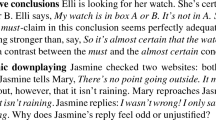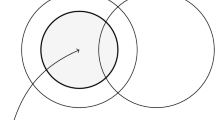Abstract
According to Kratzer’s influential account of epistemic must and might, these operators involve quantification over domains of possibilities determined by a modal base and an ordering source. Recently, this account has been challenged by invoking contexts of ‘epistemic tension’: i.e., cases in which an assertion that must\(\phi \) is conjoined with the possibility that \(\lnot \phi \), and cases in which speakers try to downplay a previous assertion that must\(\phi \), after finding out that \(\lnot \phi \). Epistemic tensions have been invoked from two directions. Von Fintel and Gillies (Nat Lang Semant 18(4):351–383, 2010) propose a return to a simpler modal logic-inspired account: must and might still involve universal and existential quantification, but the domains of possibilities are determined solely by realistic modal bases. In contrast, Lassiter (Nat Lang Semant 24(2):117–163, 2016), following Swanson (Interactions with context. Ph.D. thesis, MIT, 2006; and in A. Eagan and B. Weatherstone, eds., Epistemic Modality, Oxford UP, 2011), proposes a more revisionary account which treats must and might as probabilistic operators. In this paper, we present a series of experiments to obtain reliable data on the degree of acceptability of various contexts of epistemic tension. Our experiments include novel variations that, we argue, are required to make progress in this debate. We show that restricted quantificational accounts à la Kratzer fit the overall pattern of results better than either of their recent competitors. In addition, our results help us identify the key components of restricted quantificational accounts, and on that basis propose some refinements and general constraints that should be satisfied by any account of the modal auxiliaries.
Similar content being viewed by others
References
Alxatib, S., P. Pagin, and U. Sauerland. 2013. Acceptable contradictions: Pragmatics or semantics? Journal of Philosophical Logic 42: 619–634.
Andrews, K., 2016. Animal cognition. In Stanford encyclopedia of philosophy, ed. D.E. Zalta, CSLA, Stanford, https://plato.stanford.edu/archives/sum2016/entries/cognition-animal/.
Carey, S. 2009. The origin of concepts. Oxford: Oxford University Press.
Cesana-Arlotti, N., A. Martín, E. Téglás, L. Vorobyova, R. Cetnarski, and L.L. Bonatti. 2018. Precursors of logical reasoning in preverbal human infants. Science 359 (6381): 1263–1266.
Foley, R. 1992. The epistemology of belief and the epistemology of degrees of belief. American Philosophical Quarterly 29 (2): 111–124.
Giannakidou, A., and A. Mari. 2016. Epistemic future and epistemic must: Nonveridicality, evidence and partial knowledge. In Mood, aspect and modality: New answers to old questions, ed. J. Blaszczak, A. Giannakidou, D. Klimek-Jankowska, and K. Migdalski, 75–117. Chicago, IL: The University of Chicago Press.
Goodhue, D. 2017. Must p is felicitous only if \(p\) is not known. Semantics and Pragmatics 10 (14): 1–27.
Gopnik, A. 2003. The theory theory as an alternative to the innateness hypothesis. In Chomsky and his critics, ed. L. Anthony and N. Hornstein, 238–254. New York: Basic Blackwell.
Gopnik, A., and L. Schulz. 2004. Mechanisms of theory formation in young children. Trends in Cognitive Sciences 8 (8): 371–377.
Hacquard, V. 2011. Modality. In Semantics: An international handbook of natural language meaning, vol 2, chap. 59, ed. C. Maienborn, K. von Heusinger, and P. Portner, 1848–1515. Berlin: De Gruyter.
Harman, G. 1986. Change in view. Cambridge, MA: MIT Press.
Khoo, J. 2014. Modal disagreements. Inquiry 58 (5): 511–534.
Klecha, P. 2012. Positive and conditional semantics for gradable modals. In Proceedings of Sinn und Bedeutung 16, 363–376. Cambridge, MA: MITWPL.
Klecha, P. 2014. Bridging the divide: Scalarity and modality. Ph.D thesis, University of Chicago.
Klecha, P. 2018. On unidirectionality in precisification. Linguistics and Philosophy 41: 87–124.
Knobe, J., and S. Yalcin. 2014. Epistemic modals and context: Experimental data. Semantics and Pragmatics 7: 1–21.
Kratzer, A. 1981. The notional category of modality. In Words, worlds, and contexts: New approaches in word semantics, ed. H. Eikmeyer and H. Reiser, 38–74. Berlin: De Gruyter.
Kratzer, A. 1991. Modality. In Semantics: An international handbook of contemporary research, ed. A. von Stechow and D. Wunderlich, 639–650. Berlin: De Gruyter.
Kratzer, A. 2012. Modals and conditionals. Oxford: Oxford University Press.
Krifka, M. 1999. At least some determiners aren’t determiners. In The semantics/pragmatics interface from different points of view, vol. 1, ed. K. Turner, 257–291. Amsterdam: Elsevier.
Kvanvig, J.L. 2009. Assertion, knowledge, lotteries. In Williamson on knowledge, ed. P. Greenough and D. Pritchard, 140–160. Oxford: Oxford University Press.
Lackey, J. 2007. Norms of assertion. Noûs 41 (4): 594–626.
Lasersohn, P. 1999. Pragmatic halos. Language 75 (3): 522–551.
Lassiter, D. 2016. Must, knowledge, and (in)directness. Natural Language Semantics 24 (2): 117–163.
Lassiter, D. 2017. Graded modality: Qualitative and quantitative perspectives. Oxford: Oxford University Press.
Lauer, S. 2013. Towards a dynamic pragmatics. Ph.D. thesis, Stanford University.
Mandelkern, M. 2016. A solution to Karttunen’s problem. In Proceedings of Sinn und Bedeutung, ed. R. Trueswell, 1–18. Edinburgh: University of Edinburgh.
Mayr, C. 2013. Implicatures of modified numerals. In From grammar to meaning: The spontaneous logicality of language, ed. I. Caponigro and C. Cecchetto, 139–171. Cambridge: Cambridge University Press.
Moss, S. 2015. On the semantics and pragmatics of epistemic vocabulary. Semantics and Pragmatics 1:1–43.
Ninan, D. 2018. Relational semantics and domain semantics for epistemic modals. Journal of Philosophical Logic 47 (1): 1–16.
Portner, P. 2009. Modality. Oxford: Oxford University Press.
Roberts, C. 2015. The character of epistemic modality: Evidentiality, indexicality, and what’s at issue. Manuscript, The Ohio State University.
Rooth, M. 1992. A theory of focus interpretation. Natural Language Semantics 1 (1): 75–116.
Rooth, M. 1996. Focus. In The handbook of contemporary semantic theory, ed. Shalom Lappin, 271–297. Oxford: Blackwell.
Santorio, P., and J. Romoli. 2017. Probability and implicatures: A unified acccount of the scalar effects of disjunction under modals. Semantics and Pragmatics 10(13).
Sauerland, U. 2011. Vagueness in language: The case against fuzzy logic revisited. In Understanding vagueness: Logical, philosophical and linguistic perspectives, ed. P. Cintula, C. Fermüller, L. Godo, and P. Hájek, 185–98. London: College Publications.
Sharvit, Y. 2017. A note on (Strawson) entailment. Semantics and Pragmatics 10: 1–38.
Spelke, E.S., and K.D. Kinzler. 2007. Core knowledge. Developmental Science 10 (1): 89–96.
Swanson, E. 2006. Interactions with context. Ph.D thesis, MIT.
Swanson, E. 2011. How not to theorize about the language of subjective uncertainty. In Epistemic modality, ed. A. Egan and B. Weatherson, 249–269. Oxford: Oxford University Press.
Swanson, E. 2016. The application of constraint semantics to the language of subjective uncertainty. Journal of Philosophical Logic 45 (2): 121–146.
van Benthem, J. 2010. Modal logic for open minds. Stanford, CA: CSLI Publications.
van Benthem, J., and S. Smets. 2015. Dynamic logics of belief change. In Handbook of epistemic logic, ed. H. van Ditmarsch, J.Y. Halpern, W. van der Hoek, and B. Kooi, 313–385. London: College Publications.
von Fintel, K. 1999. NPI licensing, Strawson entailment, and context dependency. Journal of Semantics 16 (2): 97–148.
von Fintel, K., and A.S. Gillies. 2010. Must... stay... strong!. Natural Language Semantics 18 (4): 351–383.
von Fintel, K., Gillies, A.S. 2018. Still going strong: The semantics and pragmatics of epistemic must. Manuscript, MIT and Rutgers University.
Willer, M. 2013. Dynamics of epistemic modality. Philosophical Review 122 (1): 45–92.
Williamson, T. 2000. Knowledge and its Limits. Oxford: Oxford University Press.
Yalcin, S. 2005. A puzzle about epistemic modals. In New work on modality (MITWPL 51), ed. J. Gajewski et al., 231–272. Cambridge, MA: MIT.
Yalcin, S. 2007. Epistemic modals. Mind 116 (464): 983–1026.
Yalcin, S. 2010. Probabilistic operators. Philosophy Compass 5 (11): 916–937.
Yalcin, S. 2011. Nonfactualism about epistemic modality. In Epistemic modality, ed. A. Egan and B. Weatherson, 295–332. Oxford: Oxford University Press.
Author information
Authors and Affiliations
Corresponding author
Additional information
Publisher's Note
Springer Nature remains neutral with regard to jurisdictional claims in published maps and institutional affiliations.
This research was supported by funding from the Weinberg Institute for Cognitive Science at the University of Michigan, Ann Arbor, Stanford University, and the Leibniz Center for General Linguistics, Berlin.
Rights and permissions
About this article
Cite this article
Del Pinal, G., Waldon, B. Modals under epistemic tension. Nat Lang Semantics 27, 135–188 (2019). https://doi.org/10.1007/s11050-019-09151-w
Published:
Issue Date:
DOI: https://doi.org/10.1007/s11050-019-09151-w




